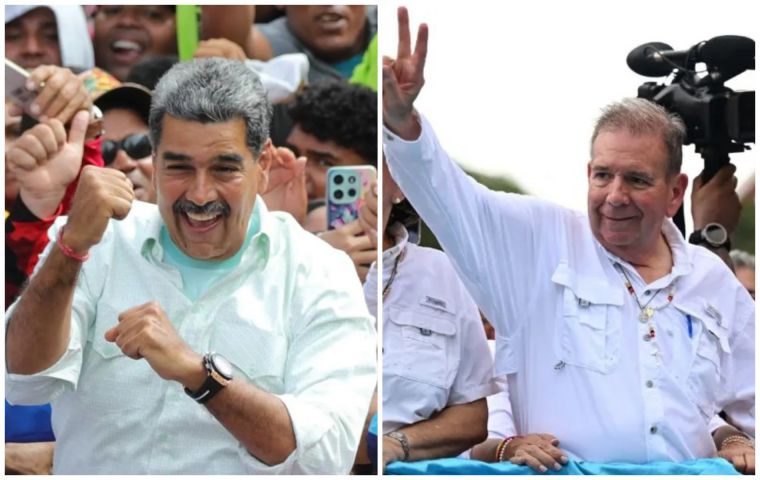MercoPress. South Atlantic News Agency
Venezuela votes: A Nation at a crossroads after 25 Years of Chavismo
 Nicolás Maduro and Edmundo González Urrutia, main candidates
Nicolás Maduro and Edmundo González Urrutia, main candidates Venezuelans are heading to the polls today in a highly anticipated presidential election that could end a quarter-century of Chavismo. The nation faces a crucial decision between maintaining the current government under President Nicolás Maduro or opting for change led by opposition candidate Edmundo Gonzalez, supported by political leader Maria Corina Machado.
This is the sixth presidential election since Hugo Chávez came to power in 1998, and the country is at a historic crossroads. Inside the opulent Miraflores Palace, the presidential headquarters adorned with portraits and busts of Simón Bolívar and Chávez, there is an atmosphere of disbelief. Within the ruling PSUV, leaders have told the media that there was no proper risk analysis before the election. Despite their confidence a few months ago, President Maduro and his advisors now face an unexpectedly formidable challenge.
The opposition, previously plagued by infighting and defeats, has rallied around Edmundo Gonzalez after Machado, who won the opposition-organized primary in 2023 by a landslide, was disqualified in January. Gonzalez, a 74-year-old diplomat who likes to read classics in his Caracas apartment, was initially reluctant to enter the political fray, but was persuaded by Machado. Together, they have toured the country and gained significant support. Maduro, meanwhile, has campaigned vigorously, surrounded by the core of Chavismo, stressing that his leadership is crucial for continued economic stability and peace.
The stakes are high. Polls suggest the opposition has a significant lead, although some analysts caution against overconfidence due to potential biases in the data. The PSUV's internal polls reportedly show Maduro with an eight-point lead. Nevertheless, the atmosphere is tense, and the possibility of defeat is being discussed more openly than ever in Chavista circles.
Chavismo's control over national institutions, including the National Electoral Council (CNE), remains a contentious issue. The CNE, led by Elvis Amoroso, has shown favoritism toward Maduro, raising concerns about the fairness of the election. However, the automated voting system, designed to prevent fraud, has provided some assurance of a fair count, although Maduro's overwhelming media presence and the strategic mobilization of public employees - threatened by activists that they'd lose their jobs if Maduro won - have complicated the electoral landscape.
As Venezuelans cast their ballots at more than 15,700 polling stations, there is a noticeable police presence in addition to the usual military security, an unusual measure that reflects the government's narrative of potential opposition-led unrest.
380,000 military and police personnel have been mobilized, ostensibly to maintain public order. Despite this heavy security presence, incidents have been minimal so far. Delsa Solórzano, a leader of the opposition coalition, noted the absence of the usually disruptive “colectivos,” armed groups loyal to Chavismo that have been responsible for harassing opposition and student protests over the past decade.
The outcome of this election is crucial. If Maduro secures another term, he faces the challenge of winning international recognition and the lifting of economic sanctions. He has refused to sign a willingness to reach a political agreement with the opposition, a move supported by regional allies such as Gustavo Petro, Lula da Silva, and Gabriel Boric. These leaders have urged Maduro to commit to democratic processes to increase his legitimacy.
In the event of an opposition victory, Venezuela would enter uncharted territory. Gonzalez and Machado are committed to a peaceful transition and have proposed an amnesty for Chavista leaders to ensure a smooth handover. The opposition envisions a cooperative transition period through January 10, with Gonzalez assuming authority in a predominantly Chavista political landscape.
As Venezuelans vote, the future of the nation hangs in the balance. Today's election could redefine not only Venezuela's political trajectory and position on the global stage, but also the stability and democratic prosperity of the region.




Top Comments
Disclaimer & comment rules-

-

-

Read all commentsThis article paints a picture of a tense “democratic” election. It is tense, but nonetheless, it is democratic.
Jul 28th, 2024 - 02:07 pm +1Makes everything sound legitimate, right?
Maduro is a dictator, he and his government do not hold their power by democratic means.
Look at how objective this sentence in the article sounds,
“after Machado, who won the opposition-organized primary in 2023 by a landslide, was disqualified in January.”
Mercopress makes no mention of who authored this article. Does that anonymous author, whose credentials are perfectly unknown, care to expand on why a candidate who won a primary by a landslide was disqualified?
No, the author brushes right past that question that begs to be answered.
From that disqualification and forward, this election has been rigged. It is not “democratic”.
The international community has never recognized Maduro as a legitimate leader. He and his government are a dictatorship and in power by fake elections that are blatantly not legitimate.
Does this author make objective mention of this perfect absence of democracy up until this election?
I suspect this article is a propaganda piece.
It makes everything about this election seems perfectly normal and the article's perfect lack of reference to abnormalities is suspicious.
So, it seems, this is a perfectly legitimate election, which you will see, Maduro conveniently won.
So Maduro, who has been a dictator up until this time, is now a perfectly legitimate leader.
Taken right out of the Russian handbook for fake democracy. Probably with their help.
Let's not forget what happens after the “landslide” to the opponents...
Jul 28th, 2024 - 07:36 pm 0@Jeff12
Jul 28th, 2024 - 10:47 pm 0Good point. Journalists in the U.S. are also propaganda mouthpieces.
As the U.S. is not even close to being a real democracy,
such as which countries then come close to being a real democracy?
Commenting for this story is now closed.
If you have a Facebook account, become a fan and comment on our Facebook Page!